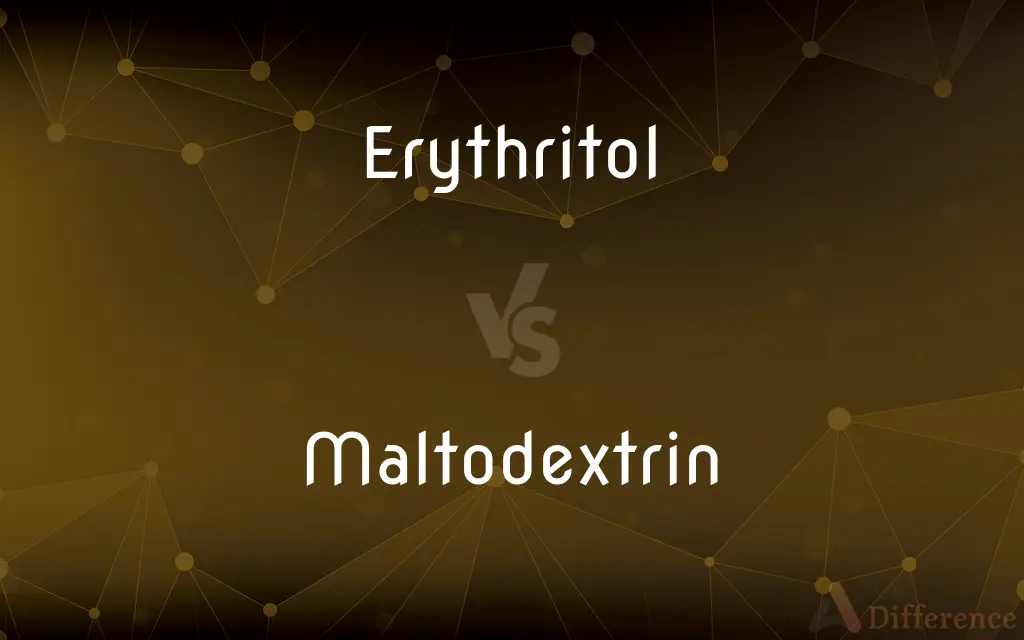Erythritol vs. Maltodextrin — What's the Difference?
By Fiza Rafique & Maham Liaqat — Updated on April 2, 2024
Erythritol is a sugar alcohol used as a low-calorie sweetener with a glycemic index of zero, while Maltodextrin is a polysaccharide used as a thickener or filler with a high glycemic index.

Difference Between Erythritol and Maltodextrin
Table of Contents
ADVERTISEMENT
Key Differences
Erythritol is a sugar alcohol derived from fermenting the glucose in corn or wheat. It is used as a sugar substitute because it provides almost no calories and does not affect sugar levels, making it popular among those following low-carb diets. On the other hand, Maltodextrin is a polysaccharide produced from vegetable starch through partial hydrolysis. It is commonly used in processed foods as a thickener, preservative, or to improve texture or shelf life. Unlike erythritol, maltodextrin can significantly impact sugar levels due to its high glycemic index.
The main appeal of erythritol lies in its ability to sweeten foods and beverages without contributing to the caloric intake significantly. This makes it an excellent option for weight management and for people with diabetes looking to control their sugar levels. Maltodextrin, however, is valued for its ability to enhance the texture and extend the shelf life of food products. It is often used in sports drinks, snacks, and other processed foods to improve mouthfeel or solubility.
Erythritol has a cooling effect on the palate, which can influence the sensory experience of the products it is used in. This characteristic is particularly noticeable in sugar-free gums and candies. In contrast, maltodextrin is tasteless and does not alter the flavor of foods, making it a versatile ingredient in creating desired food textures without affecting taste.
While erythritol is generally recognized as safe for consumption and does not tend to cause digestive issues for most people, some individuals may experience digestive discomfort if consumed in large quantities. Conversely, maltodextrin can affect digestive health more markedly, especially for those with sensitivities or intolerances, as it is rapidly absorbed and can spike sugar levels.
Comparison Chart
Type
Sugar alcohol
Polysaccharide
ADVERTISEMENT
Primary Use
Low-calorie sweetener
Thickener, filler
Caloric Content
Zero or very low
High
Glycemic Index
Zero
High
Effect on Sugar
No impact
Significant impact
Taste/Texture
Cooling effect, slightly sweet
Tasteless, affects texture
Common Applications
Sugar-free products, low-carb diets
Processed foods, sports drinks
Digestive Impact
Generally well tolerated; possible discomfort in large amounts
Can cause spikes in sugar, potential digestive discomfort
Compare with Definitions
Erythritol
Sugar substitute.
Erythritol is preferred for its zero-calorie sweetness in keto desserts.
Maltodextrin
Food thickener.
Maltodextrin adds volume and texture to sauces and soups.
Erythritol
Low glycemic impact.
Using erythritol allows diabetics to enjoy sweet tastes without affecting blood sugar.
Maltodextrin
Solubility enhancer.
Maltodextrin improves the solubility of powdered drink mixes.
Erythritol
Fermented sweetener.
Erythritol is produced through the fermentation of corn glucose.
Maltodextrin
Shelf-life extender.
Snack foods often contain maltodextrin to improve their shelf life.
Erythritol
Cooling sensation.
The cooling effect of erythritol is distinctive in sugar-free gum.
Maltodextrin
High glycemic index.
Athletes use maltodextrin in energy drinks for quick energy.
Erythritol
Digestive tolerance.
Erythritol is easier on the stomach than other sugar alcohols.
Maltodextrin
Processed from starch.
Maltodextrin can be derived from corn, potato, or rice starch.
Erythritol
Erythritol is a chemical compound, a sugar alcohol (or polyol), used as a food additive and sugar substitute. It is naturally occurring and is made from corn using enzymes and fermentation.
Maltodextrin
Maltodextrin is a polysaccharide that is used as a food additive. It is produced from vegetable starch by partial hydrolysis and is usually found as a white hygroscopic spray-dried powder.
Erythritol
(organic compound) A tetrahydric sugar alcohol (2R,3S)-butane-1,2,3,4-tetraol that occurs in some fruit; it is used as a sugar substitute
Maltodextrin
(carbohydrate) A type of dextrin commonly used as a food additive
Common Curiosities
What is erythritol?
Erythritol is a sugar alcohol used as a low-calorie sweetener, popular in keto and low-carb diets due to its zero glycemic index.
Is maltodextrin bad for you?
While not inherently "bad," maltodextrin can spike blood sugar levels and may not be suitable for people with diabetes or those following a low-carb diet.
Why would someone choose erythritol over maltodextrin?
Someone might choose erythritol over maltodextrin to reduce calorie intake, avoid blood sugar spikes, or for dietary preferences such as keto.
Is erythritol natural?
Erythritol is considered natural as it is derived from fermenting natural sources like corn or wheat glucose, though it undergoes processing.
What is maltodextrin?
Maltodextrin is a polysaccharide derived from starch, used as a food additive to thicken, filler, or stabilize processed foods.
Can erythritol replace sugar in recipes?
Yes, erythritol can replace sugar in many recipes, especially suitable for low-calorie and low-carb baking, but it may affect texture and taste.
Can I use maltodextrin for weight loss?
Maltodextrin is high in calories and has a high glycemic index, making it less ideal for weight loss compared to low-calorie sweeteners like erythritol.
Do erythritol and maltodextrin taste the same?
No, erythritol has a sweet taste with a cooling effect, while maltodextrin is tasteless but affects the texture of food.
Why is maltodextrin in so many processed foods?
Maltodextrin is used extensively due to its neutral taste, ability to improve texture and solubility, and to extend shelf life in processed foods.
Are there any digestive side effects to erythritol or maltodextrin?
Both can cause digestive discomfort if consumed in large quantities, with maltodextrin potentially having a more significant impact on those with sensitivities.
Share Your Discovery

Previous Comparison
Quickly vs. Slowly
Next Comparison
Cardinal vs. MaroonAuthor Spotlight
Written by
Fiza RafiqueFiza Rafique is a skilled content writer at AskDifference.com, where she meticulously refines and enhances written pieces. Drawing from her vast editorial expertise, Fiza ensures clarity, accuracy, and precision in every article. Passionate about language, she continually seeks to elevate the quality of content for readers worldwide.
Co-written by
Maham Liaqat













































